Britain will consider all options for Northern Ireland including direct rule from London if politicians there fail to form a regional government in the next three weeks, the minister for the province said on Tuesday.
Northern Ireland politics has been in crisis since Irish nationalist party Sinn Fein pulled out of government in January, sparking a March 2 election that ended the majority pro-British unionists had enjoyed in the province for almost a century.
The expiration on Monday of a three-week deadline to form a government raised fears that power might revert from the regional parliament to the British government in London, a step that took five years to reverse the last time it happened.
"We do not want to see a return to direct rule," Northern Ireland minister James Brokenshire told the British parliament on Tuesday. "But should talks not succeed in their objective, the government will have to consider all options."
If no agreement has been reached, the British parliament will begin to fill the power vacuum in Northern when it returns from its Easter recess on April 18 by bringing legislation to set local taxes on homes and businesses, he said.
"Following the Easter recess, it would be my intention at a minimum to bring forward legislation to set a regional rate to enable local councils to carry out their functions," he said.
"In the absence of the devolved government, it is ultimately for the UK government to provide political stability and good governance," he said.
Both of the main parties involved in the talks, Irish nationalist Sinn Fein and the pro-British Democratic Unionist Party have voiced strong opposition to direct rule from London.
Sinn Fein leader Gerry Adams has said a return to direct rule would be an "enormous act of bad faith" by the British government.
While no one is predicting the political impasse risks returning Northern Ireland to the violence between Irish nationalists and pro-British unionists that killed 3,600 people in three decades before a 1998 peace deal, it could increase sectarian tensions and freeze decision-making as Britain prepares to leave the European Union.
As the only part of the United Kingdom with a land border with the EU, Northern Ireland faces severe disruption to its economy. Any sign of border controls could inflame opinion among Irish nationalists who want a united Ireland.
The province's political crisis began in January when Sinn Fein pulled out of the province's government citing the "deep-seated arrogance" of power-sharing partner the Democratic Unionist Party over the DUP's handling of the abuse of an energy subsidy scheme.
Sinn Fein presented a long list of demands as conditions to re-enter government, including funding services for Irish language speakers, gay rights and inquiries into deaths during the decades of sectarian violence.
The DUP balked, suggesting Sinn Fein was asking for too much because it wanted the talks to fail.
© Reuters News







0 comments:
Post a Comment